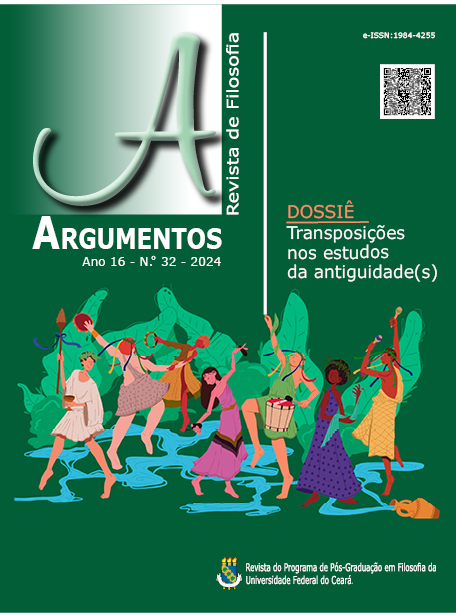The question of anguish as a form of a proper self-existence in Martin Heidegger
Keywords:
Ontology. Phenomenology. Dasein. Being.Abstract
This article constitutes a brief exegesis of the first part of the work Being and Time, in which Heidegger discusses the fundamental dispositions that open existence (Dasein) as being-in-theworld, and which are determined as: anguish, fear and boredom. As fundamental dispositions, they are distinguished from their surface factual manifestations, such as fears and panic (derived from the fundamental disposition of fear), restlessness and anxieties (derived from structural anguish), disinterest and even the apparent “opposite” of the latter, the overwhelming curiosity (derived from boredom). These here are, for Heidegger, all phatic modes derived from fundamental (structural) dispositions that can thus be appreciated ontically (phatically). This article proposes, therefore, to succinctly elaborate an exegesis on this issue in Heidegger’s phenomenology, so that maybe we can take one more step in understanding what the philosopher thinks with respect to the very structure of the Being-man.
References
HEIDEGGER, M. Que é Metafísica? In: Conferências e Escritos Filosóficos. Tradução de Ernildo Stein. São Paulo: Abril Cultural, 1973. (Coleção Os Pensadores).
HEIDEGGER, M. Sein und Zeit. 17. Aufl. Tübingen: Max Niemeyer Verlag GnbH e Co. 1993.
HEIDEGGER, M. Sobre a Essência do Fundamento. Tradução de Ernildo Stein. São Paulo: Abril Cultural, 1979. (Coleção Os Pensadores).
HEIDEGGER, M. The Metaphysical Foundations of Logic. Translated by Michael Heim. Bloomington; Indianapolis: Indiana University Press, 1982.
Downloads
Published
Issue
Section
License
Argumentos magazine is licensed under an International Creative Commons Attribution License.
The Magazine uses CC BY inclusion
1) The authors retain the copyright granted to the magazine or the right to initial publication, with the work regularly licensed under the Creative Commons Attribution, which allows the sharing of the work with acknowledgment of authorship and initial publication in this magazine.
2) The authors are authorized to contract additional applicable contracts, for non-exclusive distribution of the version of the work published in this journal (for example, publication in the institutional repository or as a chapter of the book), recognition of authorship and initial publication in this journal.
3) Authors are authorized and encourage to publish and distribute their work online (for example, in institutional repositories or on their personal pages) at any time before or during the editorial process, as they can generate productive changes, as well as increase the impact and reference of published work.




.jpg)










._._3.png)
1.jpg)
._._._.png)
